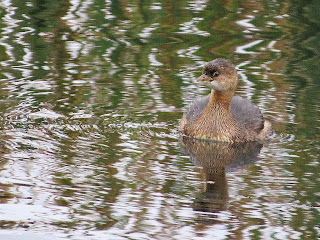A cheeky wee Pied-billed Grebe, thinking that
he is keeping his secrets from you
I accidentally stumbled upon the fact that Western Grebe chicks have a yellow or grayish bare spot on their heads that turns bright red when they hungry and beg for food. It goes back to its normal color when crops are full.
The chicks are brooded on their parents' backs and fed there as well, rather than in the nest, which is mostly abandoned when they hatch. When one parent gets tired of "back brooding" it rises up in the water to dump the kids in the drink. They are able to swim to the other parent, which sometimes is generous enough to stick out a foot for them to use as a step to get aboard.
The parents feed feathers to the chicks right from the start.
Yum
The kids poop when they hit the water. Thus Mom and Dad flap their wings and dump them in the drink quite frequently. Can't say as I blame them. Beats changing diapers.
Red-necked Grebes on the mighty Mohawk
Late in the parenting sequence the adults often split the family and each take a portion off to feed. They get back together later. Maybe.
I have never seen a Western Grebe and probably never will, but their sheer weirdness is a delight to me.
Which brings me to Pied-billed Grebes, which are not uncommon around here, and which I do see reasonably regularly and hear even more often. If you experience background sounds out in the marsh that make you think you are suddenly inside a Tarzan movie, there's a good chance it's Pied-billed Grebe.
They are odd too. It is not abnormal for them to lay eggs into a cup in their nest platform that is barely at water level. Sometimes they are even laid in a puddle of water. Eggs don't care; they have a special coating. The parents gradually build the nest up and by the time they hatch the cup is no longer quite as wet.
Parents cover the incubating eggs with plant matter when they leave the nest and often stay away for prolonged periods, relying on the heat of decaying vegetation to keep the eggs warm (alligators anyone?)
My vocabulary word when reading about grebes is nidifugous. It means the little guys leave the nest soon after hatching. Once again they are back brooded. (If anyone knows how to pronounce it give me a call. I Googled it and found at least five entries on the first page...every single one of them was different. So I still don't know...)
Anyhow, I love grebes.
I have seen three species, Pied-billed, Red-Necked, and Horned. However, I have never been in a position to personally observe their babysitting (or maybe I should say baby dumping) behavior, so this information was obtained from Cornell's excellent resource, Birds of the World, which I highly recommend. It is like a college course that you study at your own speed, directed by your own interests. Personally, if I see an intriguing behavior or just wonder where a species migrates, or nests, or what they eat, or odd ways they care for chicks, I check it out. I even have a shortcut on my phone so I can learn in the field.
You never know. I might learn useful new words like nidifugous, which might help me sound intelligent in birdy company, if only I could pronounce it.








No comments:
Post a Comment